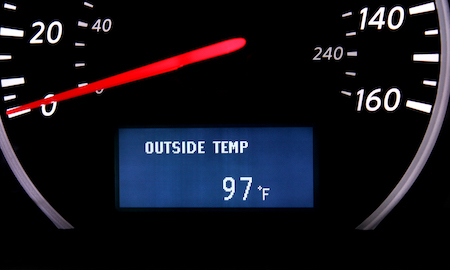Coloradoans love being outside. Summer, winter, sunshine, or snow, there are so many ways you can enjoy the great outdoors.
But to get where you’re going, you’re going to need a reliable car. While people often complain of driving on icy, snow-packed roads, it’s summer heat that can impact your vehicle in different ways.
As the temperatures continue to climb, start paying attention to telltale signs your car may be making. The scorching summer heat can take a toll on our vehicles, leading to potential breakdowns and costly repairs.
How summer heat affects your car
You can’t help but notice summer heat’s impact when you climb into your vehicle. Touch the steering wheel, and you’ll feel the burn. On the hottest days your air conditioner works hard to try and keep you cool.
All of that heat can impact your car in many ways.
Battery
High temperatures accelerate chemical reactions within the battery, causing it to lose its charge faster. The heat can also cause the battery’s fluid to evaporate, leading to corrosion and diminished performance. If you have an older battery that was already on its way out, you might find a dead battery when you head out to your car.
Engine
The intense heat of summer can cause the engine to overheat. When the cooling system fails to dissipate the excess heat generated by the engine, it can lead to engine damage. Overheating can result in warped cylinder heads, blown gaskets, and even complete engine failure if not addressed promptly.
Starter and Ignition
Extreme heat can exacerbate existing issues with the car’s starter motor and ignition system. The electrical components can expand due to the heat, increasing resistance and making it harder for the engine to start. This can result in starting issues, potentially leaving you stranded on a hot summer day.
Tires
Hot pavement and high temperatures can cause problems for your car’s tires. The air inside the tires expands with the heat, leading to overinflation. Overinflated tires are more prone to blowouts, decreased traction, and reduced fuel efficiency. Scorching asphalt can also accelerate tire wear, making them more susceptible to punctures and blowouts.
Fluids
Summer heat can affect various fluids in your car. Coolant, for example, is essential for preventing engine overheating. High temperatures can cause the coolant to evaporate faster, leading to a higher risk of engine overheating. Other fluids, such as brake fluid, power steering fluid, and transmission fluid, can also be affected by the heat. Fluid levels can decrease due to evaporation, potentially leading to system malfunctions.
Air Conditioning
Your car’s air conditioning system works harder in the summer to keep you cool. However, prolonged use in high temperatures can put a strain on the system. Components such as the compressor can be affected, leading to reduced cooling performance or even failure of the air conditioning system.
Paint and Interior
The sun’s UV rays can cause damage to your car’s paint over time. Fading, peeling, and cracking of the paintwork are common issues. The intense heat can also cause damage to the car’s interior, such as cracking and warping of dashboard materials and fading of upholstery and trim.
How to avoid heat-related breakdowns
While summer heat can be challenging for your car, you can take several preventive measures to keep it running smoothly throughout the season.
Check your battery
Regularly inspect your car’s battery for signs of corrosion and ensure the connections are tight. If your battery is over three years old, it’s wise to have it tested by a professional to ensure it can handle summer demands.
Check your oil
Hot weather places additional strain on your car’s engine, making it crucial to have the correct oil viscosity. Consult your vehicle’s owner’s manual and switch to an oil grade suitable for warmer temperatures.
Check your tire pressure
Monitor your tire pressure regularly during the summer months. Hot temperatures cause the air inside the tires to expand, potentially leading to overinflation. Use a reliable pressure gauge and adjust the tire pressure according to the manufacturer’s recommendations.
Check your coolant
Inspect the coolant level and condition to prevent your engine from overheating. Ensure that the coolant mixture is correct and there are no leaks in the system. If needed, top up the coolant or have it flushed and replaced by a professional.
Top of fluids
Inspect and refill other vital fluids, such as brake fluid, power steering fluid, and transmission fluid. High temperatures can accelerate fluid evaporation, so it’s essential to maintain the appropriate levels for optimal performance.
Pay attention to the air conditioner
Before the heat becomes unbearable, check your car’s air conditioning system. Inspect the coolant level, clean or replace the cabin air filter, and ensure the system is blowing cold air. If you notice any issues, have your air conditioning system serviced by a professional.
Check your windshield wipers
Colorado summers can be a mix of everything. It’s not unusual to have blazing sun, showers, and hail, all on the same day. Ensure that your windshield wipers are in good condition and replace them if they are worn out. Clear visibility is crucial for safe driving, especially during unexpected summer storms.
Create a summer car breakdown kit
It’s always best to be prepared, especially if you’re heading up into the mountains. We suggest always having a breakdown kit on hand. In the summer, include things like water, non-perishable snacks, first aid kit, sunscreen, emergency blanket to double as a shade protector, flashlight, basic tool kit, cell phone charger, jumper cables, can of tire sealant, work gloves, and hazard signs or flares.
Be prepared for the summertime heat
Summer is a time for getting outside and enjoying all Colorado offers.
Before you venturing too far from home, take extra precautions to ensure your car works well. Have questions? We’re happy to answer them. And ensure your safety no matter where your travels take you.

